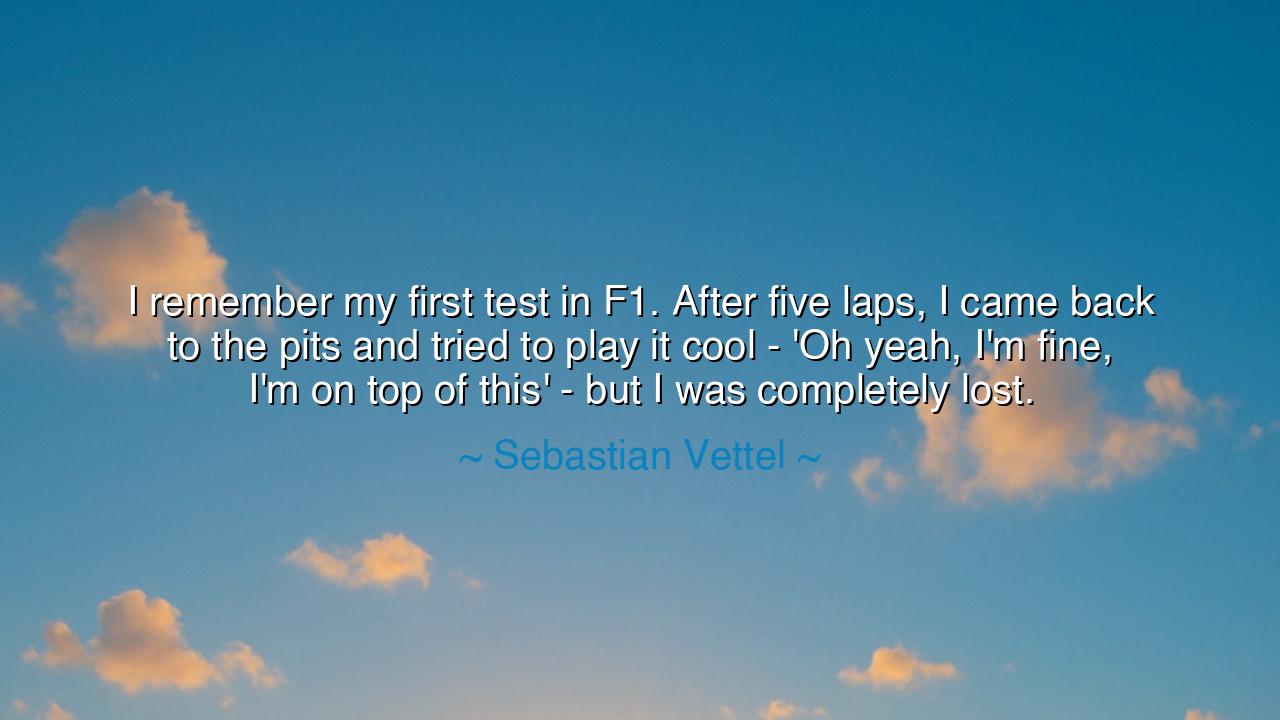
I remember my first test in F1. After five laps, I came back to
I remember my first test in F1. After five laps, I came back to the pits and tried to play it cool - 'Oh yeah, I'm fine, I'm on top of this' - but I was completely lost.






"I remember my first test in F1. After five laps, I came back to the pits and tried to play it cool - 'Oh yeah, I'm fine, I'm on top of this' - but I was completely lost." These words spoken by Sebastian Vettel carry a profound truth about the journey of mastery, the humility that accompanies growth, and the grit required to face the unknown. Vettel, a celebrated Formula 1 driver, speaks not just of the challenges of racing, but of the human experience in any field, especially when one is confronted with the reality of stepping into the unknown. His initial attempt to "play it cool" masks the truth: even the most talented individuals must wrestle with moments of self-doubt and uncertainty.
In the ancient world, the great warriors and philosophers alike had to contend with the realization that true mastery is not achieved immediately. Achilles, the hero of the Iliad, though a mighty warrior, faced moments of vulnerability. The very same arrogance that made him a legend was also the root of his downfall—his refusal to listen to his inner self and to the counsel of his companions. Like Achilles, Vettel’s moment of vulnerability—his feeling of being "completely lost"—is a reminder that even the greatest heroes are not immune to moments of self-doubt. True greatness, as both Achilles and Vettel reveal, lies not in pretending to have it all figured out, but in recognizing our own limitations and using them as the fuel for growth.
This story also mirrors the journey of the great philosophers. Socrates famously said, "I know that I am intelligent, because I know that I know nothing." In this paradox, Socrates spoke to the humility required for true learning. He understood that the pursuit of wisdom does not begin with confidence in one’s abilities, but with the recognition of one’s ignorance. Like Vettel, Socrates entered the unknown, aware of his own inadequacies. Only through this honest assessment of self could he continue on the path of self-improvement, ever striving to understand the world around him.
In the modern world, the temptation to project an image of perfection is stronger than ever. We often see figures like Vettel, successful and seemingly in control, but behind that image lies the reality of struggle. Vettel's admission that he was "completely lost" despite his attempts to appear confident is a powerful lesson. It reveals the duality of growth: the desire to appear confident while still grappling with the process of learning. This tension exists not just in racing, but in all human endeavors. Whether it is the artist stepping up to the canvas, the entrepreneur launching a new business, or the student entering a new field of study, there is always a moment of vulnerability before mastery is attained.
Vettel’s story brings to light the importance of authenticity and self-awareness in the journey toward mastery. Just as the great warriors of old relied on their self-reflection to guide them through battles, so too must we rely on our honest assessments of ourselves. Self-deception may lead to temporary successes, but true success comes only when we acknowledge the times we are "completely lost" and use that awareness as the foundation for growth. To be lost is not a failure; it is a necessary part of the journey toward mastery, and one that teaches us more than moments of success ever could.
Consider the example of Leonardo da Vinci, who, despite his genius, spent years in the pursuit of answers to questions that had no clear solution. Da Vinci did not present himself as a man of certainty; he was, instead, a man driven by curiosity and a passion for discovering what lay beyond his own understanding. His notebooks are filled with sketches, unanswered questions, and thoughts that reflect a mind constantly searching for the truth. Like Vettel, da Vinci’s brilliance lay not in his ability to appear perfect but in his willingness to embrace the uncertainty and failure that came with his work. The real measure of greatness, then, is not how quickly one reaches the top, but how one handles the inevitable challenges along the way.
The lesson we can take from Vettel’s words is clear: growth requires honesty and humility. No matter how skilled we may become, there will always be moments when we feel lost, uncertain, or out of our depth. These moments are not to be feared or hidden behind a facade of coolness. Instead, we must embrace them, for it is in these times of vulnerability that we learn the most. Like Socrates, we must acknowledge our own ignorance as the first step toward true wisdom. Like Vettel, we must accept that mastery is a process, and it is the willingness to face our failures with courage that ultimately leads us to success.
Let us take action by embracing the unknown in our own lives. Instead of hiding our uncertainty or pretending we have all the answers, let us lean into those moments when we feel "completely lost." These are the times that shape us, challenge us, and help us grow. Confidence will come, not from pretending to have everything figured out, but from accepting our flaws and continuing to strive for growth in the face of adversity. In this way, we learn not just to survive the race of life, but to thrive within it.






AAdministratorAdministrator
Welcome, honored guests. Please leave a comment, we will respond soon